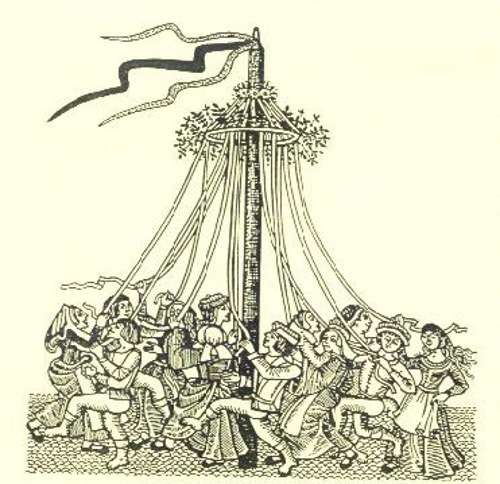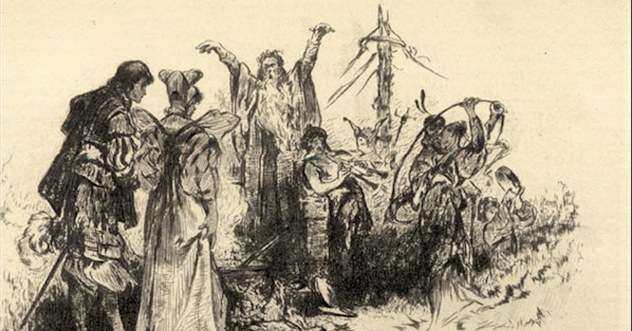Had it not been for his May Day party with a giant Maypole, Thomas Morton might have established a New England colony more tolerant, easygoing and fun than the one his dour Puritan neighbors created at Plymouth Plantation.
A well-educated, well-connected, free-thinking Englishman, Morton came to America for business reasons. He held a senior partnership in a trading venture sponsored by the Crown. In 1624, he sailed aboard the Unity with Capt. Wollaston and 30 indentured servants. They arrived safely, settled in the future Quincy, Mass., and then began trading with the Indians for furs.
Morton wrote that he found two sorts of people in New England: the Christians and the Infidels. The Infidels he found ‘most full of humanity, and more friendly than the other.’
Morton would battle the Puritans over the next two decades using his wit, his pen, his political connections and his legal expertise. He even managed to get the royal charter for the Massachusetts Bay Colony revoked.
Unfortunately for Morton, he tied his fortunes to the Crown. When the Puritan Roundheads gained the ascendancy over Royalists in 1643, Massachusetts officials arrested him. They called him a Royalist agitator and threw him into prison. Today people might call him America’s first hippie.
Nathaniel Hawthorne best described Morton’s struggles with his neighbors in his short story, The Maypole of Merrymount:
Jollity and gloom were contending for an empire.
Pagan Past
Thomas Morton was born in 1576 in Devonshire, England, a part of the country that still bore remnants of Merrie Old England’s pagan past. The son of a soldier, probably a younger son, he studied law in London at the Inns of Court, the barristers’ professional association.
Morton’s lawyering brought him the connections that brought him to New England. After he arrived he discovered he couldn’t get along with the Puritans at Plymouth Plantation. So he, Wollaston and the indentured servants established their own colony, Mount Wollaston. It grew quickly and grew prosperous.
Morton then parted ways with Wollaston in 1626 when he learned Wollaston sold indentured servants into slavery on Virginia tobacco plantations. Morton encouraged the remaining servants to rebel against Wollaston and set up their own colony.
They didn’t need much persuading. The servants organized themselves into a free community called Merrymount with Morton in command. He called himself the ‘host.’ Wollaston fled to Virginia.
Merrymount was a colonial utopia in which the settlers were considered ‘consociates.’ They lived in harmony with the Algonquin Indians. The Puritans were horrified that the liberal-minded Morton and his men consorted with native women. They considered Morton an impious, drunken libertine. And they didn’t like that his easygoing colony attracted escapees from Plymouth’s strictness.
Those Moles
For his part, Morton disdained the Puritans at Plymouth, who he called ‘those Moles.’ He complained they ‘keep ‘much ado about the tithe of mint and cumin, troubling their brains more than reason would require about things that are indifferent.’
Morton called the pompous John Endicott ‘that great swelling fellow, Captain Littleworth.’ He nicknamed the short Myles Standish ‘Captain Shrimpe.’
On May 1, 1627, Merrymount decided to throw a party in the manner of Merrie Olde England, Maypole and all. Morton hoped it would attract some Indian brides for his bachelor followers. According to Morton,
“The inhabitants of Merrymount … did devise amongst themselves to have … Revels, and merriment after the old English custom … & therefore brewed a barrell of excellent beer, & provided a case of bottles to be spent, with other good cheer, for all comers of that day. And upon Mayday they brought the Maypole to the place appointed, with drums, guns, pistols, and other fitting instruments, for that purpose; and there erected it with the help of Savages, that came thither of purpose to see the manner of our Revels. A goodly pine tree of 80 foot long, was reared up, with a pair of buckshorns nailed on, somewhat near unto the top of it; where it stood as a fair sea mark for directions, how to find out the way to mine Host of Ma-re Mount.”
Bye-bye Maypole
Gov. William Bradford was horrified by the ‘beastly practices of ye mad Bacchanalians.’ After a second Maypole party the next year, Myles Standish led a party of armed men to Merrymount, seized Morton and put him in chains. Standish also took down the offending Maypole.
Not a shot was fired. According to Morton, the Merrymount inhabitants didn’t want bloodshed. According to Bradford, they’d had so much to drink they couldn’t resist.
Bradford feared executing Morton, who had too many friends in high places in London. He did maroon him on the Isles of Shoals until September, when an English ship took him back to England. During the next winter, an especially harsh one, John Endicott led a raid on Merrymount’s corn supply. The Puritans then chopped down what was left of the Maypole.
Morton returned to New England in 1629, only to find his friends the Indians decimated by plague. Most of the Merrymount residents scattered and the Puritans’ strength increased. In September 1630, the Puritans arrested Morton again. They banished him and burned down Merrymount.
Canaan
In England, Morton plotted his revenge. Even as William Bradford was writing his History of Plimoth Plantation, Morton wrote New English Canaan, a witty composition that praised the wisdom and humanity of the Indians and mocked the Puritans. It made him a celebrity in political circles.
He also began a lawsuit against the Massachusetts Bay Colony, trying to revoke their charter. He succeeded, mostly because of King Charles’ animosity toward the Puritans. When the court ordered the charter revoked in 1634, Morton planned to return to Merrymount.
The Puritans, however, rejected the English court’s order. From 1637 to 1643, Morton and Sir Ferdinando Gorges petitioned for either a charter or an enforcement action. Unfortunately for Morton, the Crown had its own troubles – namely, the English Civil War.
Back to Plymouth
In 1642, Morton returned to Plymouth again, and again the Puritans arrested him. Not only did they view him as a ‘Royalist agitator,’ they blamed him for getting the charter revoked. They then sent him to prison in Boston, but didn’t charge him. Eventually, the Puritans granted the ill and aging Morton clemency.
Morton then spent his final days in York, Maine. He died in 1647.
Over the years other rebels and free-thinkers have lived in Merrymount, now Wollaston. Anne Hutchinson, who challenged the Puritan theocracy, lived there with her husband when they first arrived in New England in 1634. John Hancock was born there, and John Quincy Adams’ great-grandfather built a house on land in Wollaston. In 1925, a man named Howard Johnson built the first Howard Johnson’s there.
This story about the maypole that infuriated the Puritans was updated in 2024. Read more about Thomas Morton in The Trials of Thomas Morton: An Anglican Lawyer, His Puritan Foes, and the Battle for a New England by Peter C. Mancall. You can help independent bookstores and The New England Historical Society by buying it here.





45 comments
Guys, come on — You’re the New England Historical Society and you just got a critical and fundamental fact of our history wrong.
Plymouth Colony was founded and controlled by Pilgrims. They had already seperated from the Puritans before coming to America.
Massachusetts Bay Colony, which Quincy was in, was founded and controlled by Puritans.
The Pilgrims, primarily, just wanted to worship in peace. The Puritans on the other hand wanted to be, well, puritanical in their pursuit of religious purity.
Matt: Thank you for your interest. It’s really a matter of opinion rather than fact about whether to call the colonists at Plymouth Plantation ‘Puritans’ or not. We choose to view them as separating Puritans and the Massachusetts Bay colonists non-separating Puritans, as do many historians. The two groups shared many of the same beliefs, including the horror of paganism illustrated in this story.
Yes, Quincy was in the Massachusetts Bay Colony; that’s why Morton wanted to revoke the Massachusetts Bay Colony charter. The Pilgrims at Plymouth Plantation were in the neighboring colony of Plymouth.
The facts of the story suggest strongly that ‘worshiping in peace’ wasn’t quite what Plymouth Plantation was all about, since they harassed Morton, stole the corn at Merrymount and burned the village. ‘New English Canaan’ describes some of their harsh and puritanical practices.
Actually, “Puritan” was a term of derision given generally to those of the Protestant Reformation who wanted to “purify” English culture of its Catholic (and by extension, pagan) elements. So it fit both groups of Plimoth and Mass. Bay colonists, while “Pilgrim” was a title bestowed only much later by historians, taken from a self-descriptive remark in an early writing by William Bradford.
Whatever happened to the custom of decorating May Baskets and leaving them on your friends doorsteps on May 1st?
Far out!
Far out!
An interesting post – Thank you! Thomas Morton’s story is too much neglected.
My favorite description of either Puritans or Pilgrims: “They came here to worship as they saw fit – and see that everyone else did, too!”
[…] much snow fell that year, capped off by a series of storms that started in late February, that the Puritans in Boston held no church services for two successive weeks, reported Cotton Mather. The events were […]
[…] much snow fell that year, capped off by a series of storms that started in late February, that the Puritans in Boston held no church services for two successive weeks, reportedCotton Mather. The events were […]
[…] Edwards, the great Puritan theologian, helped ignite a religious revival known as the First Great Awakening across the 13 […]
[…] but when they could finally reach her as an adult it was too late. She refused to return, and her Puritan family never got over the […]
[…] to attract some Algonquin women to their community, Morton decided to throw a big party at Merrymount, with lots of alcohol, music, dancing, and a maypole. This was the last straw for the […]
[…] and its nod to the Mayflower colonists, is a perfect excuse to share this post from the New England Historical Society about a little-known episode in our Puritan past. The humans of Seven Trees Farm have ancestors on […]
[…] that those who celebrated it "are consumed in compotations, in interludes, in playing at cards, in revellings, in excess of wine, in mad mirth." No one really disagreed. It just didn’t bother some people the way it did Mather and the […]
[…] early government. But his demeanor – ‘a mad jack in his mood,’ fellow outcast Thomas Morton would say of him write of him – got the best of […]
[…] 1630, the magistrates dispatched free-thinking Thomas Morton back to England for cavorting with the naive Indians at Quincy, among other things. And they also […]
[…] were very different in the 17th century, when May Day was seen as downright sinister. According to the New England Historical Society, it all started when a man named Thomas Morton arrived in the New […]
[…] were very different in the 17th century, when May Day was seen as downright sinister. According to the New England Historical Society, it all started when a man named Thomas Morton arrived in the New […]
[…] were very different in the 17th century, when May Day was seen as downright sinister. According to the New England Historical Society, it all started when a man named Thomas Morton arrived in the New […]
[…] him Arlo Guthrie and Richard Robbins were the culprits. Officer Obie, who had no sympathy for the long-haired hippies, decided to make an example of them. He arrested them and put them in a jail cell. Alice, furious […]
[…] the 1600s, Thomas Morton founded a town called Merrymount (which was at the time an obscene slang term) and built a giant penis (a Maypole) in the town […]
[…] the 1600s, Thomas Morton founded a town called Merrymount (which was at the time an obscene slang term) and built a giant penis (a Maypole) in the town […]
[…] punishment for adultery was death (though the death penalty was rare). They banned fancy clothing, living with Indians and smoking in […]
[…] idea of joining the Manomet River and the Scusset River had been around since at least 1623, when Miles Standish made the observation that a canal route would be useful. Since then, dozens of people suggested it, […]
[…] and invited neighbouring Indians over to kick up their heels with beer, poetry, and dancing under an eighty foot maypole. One of their songs included the lines ‘Lasses in beaver coats come away, Yee shall be welcome […]
[…] much of the Indian population died there weren’t enough left to bury the dead. English colonist Thomas Morton described the heaps of dead Indians 'a new found […]
[…] The Maypole that Infuriated the Puritans https://newenglandhistoricalsociety.com/maypole-infuriated-puritans/ […]
[…] 1629, the carousing, fun-loving colonist Thomas Morton had the effrontery to erect a Maypole, right under the noses of the Pilgrims at Plymouth Colony. […]
Great article! It’s easy to identify with Morton rather than with my 11 ancestors on the Mayflower. (My family’s still resides in the Plymouth area.) As a lifetime member of the Massachusetts Descendants Society and being from Wollaston, we, the descendants, sometimes forget that if it were not the Tribal, Indigenous (Wampanoag) people of Southeastern Massachusetts we, I, would not be here. So thank you Samoset, Squanto and Massasoit. Concerning the religion of my foremothers and forefathers, I have concluded that Christianity isn’t a religion but a pathology…and this is after seminary.
Why do you say merrymount is now Wollaston? That’s not true. Merrymount is still Merymount and Wollaston is a separate section. As a child I used to dance around the maypole on maypole day with my fellow classmates at merrymount School.
[…] in a log cabin in Tallmadge, Ohio. Her father, a Congregationalist missionary, was trying to bring Puritanism to the Ohio frontier. He died when Delia was six, and the family returned to New […]
[…] They ignored Easter, Whitsunday and other holidays. May Day celebrations, which included the hated Maypole, were punished […]
[…] he had to wrestle with the challenge of long lines at his Wollaston store. He also had to keep the homemade flavor while creating it in greater and greater quantities. […]
[…] This story was updated in 2018. If you enjoyed it, you may also want to read about the Pilgrims' free-thinking neighbors in Merrymount (now Quincy, Mass.) here. […]
[…] a coincidence, given the men erected an 80-foot pole in the center of town.” Except Morton said of the pole that it stood as a “fair sea mark for directions,” describing it as […]
[…] a coincidence, given the men erected an 80-foot pole in the center of town.” Except Morton said of the pole that it stood as a “fair sea mark for directions,” describing it as […]
[…] a coincidence, given the men erected an 80-foot pole in the center of town.” Except Morton said of the pole that it stood as a “fair sea mark for directions,” describing it as […]
[…] also allowed ‘May-games, Whitsun-ales, and Morris-dances.' He also encouraged 'the setting up of May-poles and other sports therewith used: so as the same be had in due and convenient time, without […]
[…] English was all that the Puritan villagers of Salem distrusted: He was an Anglican who lived lavishly, he spoke French and he was in […]
[…] banished him from America. After attempting to start a free community in New England, Morton was arrested and sent back to England for inviting the native Alongquin people to a pagan maypole celebration in his new community. In […]
[…] baniram da América. Depois de tentar iniciar uma comunidade livre na Nova Inglaterra, Morton foi preso e enviado de volta à Inglaterra por convidar o povo nativo de Alongquin para uma celebração pagã de mastro em sua nova […]
[…] when he needed protection. His wife, Nancy Ann Bradford, was the great-great-great-granddaughter of William Bradford, governor of Plymouth Colony, and the daughter of another William Bradford who would be elected to […]
[…] the 1600s, Thomas Morton founded a town called Merrymount (which was at the time an obscene slang term) and built a giant penis (a Maypole) in the town […]
[…] was born in England in about 1627, most likely in Painswick Parish, Gloucestershire. She came to Mount Wollaston (now a part of Quincy) in the Massachusetts Bay Colony around 1635 at the age of about eight. She […]
[…] to Roger Williams’ arguments for separation of church and state, and even the anti-religious New English Canaan by Thomas Morton — a harsh critique of the Puritans’ customs and power […]
Comments are closed.